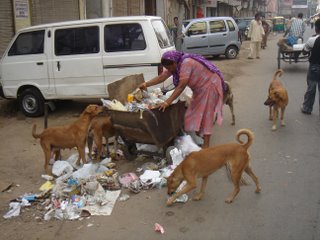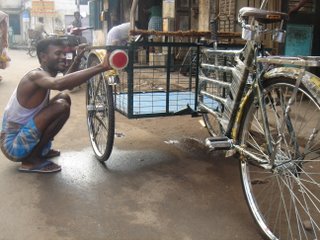Kathmandu, Nepal
Shooooooooooooooo-weeeeeeee!
 The KMC (Kathmandu Municipal Corporation) sanitation workers have been on strike here for over a week, and the city is trashed. Living in Asia, I am accustomed to a high level of street debris and smells (everyone knows Singapore does not count as Asia). But even I am not used to climbing over literal mounds of decomposing trash, sodden in the monsoon rains.
The KMC (Kathmandu Municipal Corporation) sanitation workers have been on strike here for over a week, and the city is trashed. Living in Asia, I am accustomed to a high level of street debris and smells (everyone knows Singapore does not count as Asia). But even I am not used to climbing over literal mounds of decomposing trash, sodden in the monsoon rains. The mountains of garbage - paper, burlap sacks, rotting fruit hulls, wrung-out sugarcane used to make juices, plastic bags holding moisture, spent corn cobs, banana peels, newspapers and so on - are now large enough to block traffic on the already congested city streets. Yesterday Floriane and I were walking back from Patan to New Road and traffic was at a complete standstill. We squeezed in between piled-up cycle rickshaws, taxis, motorbikes, scooters and mini-buses on roads that in any other part of the world would be considered alleys. Of course everyone has to honk, as though some obstinate person at the front of the queue is willfully holding up everyone else...and as though honking would do any good whatsoever. Normally cows, goats and street dogs take care of the overflow of organic trash, but there isn't enough livestock in the city to make a dent in all this rot.
Mosquitoes are having a field day breeding in among all the piled-up rot and my entire backside is covered in red welts.
Use and Throw
If you have never lived in Asia, you don't know trash. For one thing, there are few, if any, garbage cans on the road here. The local habit is just to "use and throw" - drink your juice, eat your candy bar, and toss the wrapper down at your feet without a second thought. In fact, if you consume your drink at the shop and ask the shopowner "where can I toss this garbage?" they will often instruct you to throw it right in the street (the phrase is "use and throw"). Most of them don't keep garbage cans. Those that do normally just toss their own garbage can's contents right into the street at night, anyway.
So garbage gets tossed into the tiny gutter, which is just a foot or 2 away from your sandalled feet, or right onto the street itself. Most streets don't have proper sidewalks ("footpaths"), with the result that you are constantly dodging garbage.
Trash: from the ground up
Here in Nepal, the Sanitation Department does not arrive in huge, roaring, dinos
 aur-like trucks with hydraulic lifts on the back. Since there are no garbage trucks, there are no dumpsters or garbage bins.
aur-like trucks with hydraulic lifts on the back. Since there are no garbage trucks, there are no dumpsters or garbage bins.In Thamel, garbage removal begins with the street sweepers. This is one of the lowest castes in Hindu society (slightly above the sewer-divers, latrine-cleaners, butchers, and those who dispose of corpses). They are employed by the city at the rate (in India) of about 100 IRs a day - that's about $2.25.
The sweepers come out after dusk and, stooping low over the broken pavement, push the accumulated gutter garbage into neat piles. A Westerner would not recognize their working equipment for what they are - brooms. To us, these brooms look like little bundles of stiff straw, sort of like uncooked spaghetti sticks wrapped in a bunch about 2 feet long and tied with a piece of twine. There is no handle, so the sweepers must bend double over the ground and have their faces in the dirt and dust for hours. They generally don't wear masks or scarves to protect their faces from the filth. Older sweepers' backs are permanently crooked.
If you were to give them a Western broom with a long handle, which would not only enable them to stand upright and save their backs, but would give them leverage and enable them to work more efficiently, they would sell them to someone and return to their familiar whisk broom. This is what they prefer. (In the 60s, one Peace Corps project became legendary among anthropologists. To enable subsistence farmers (can't remember where) to both work more quickly, and save their spines, the Peace Corps workers gave them long-handled hoes for tilling. The villagers promptly chopped the long handles off the farming implements and went back to bending double over the ground.)
Miles of piles - Recycling, Asian style
The next phase in urban sanitation are the rag pickers. This occupation covers all genders, ages and even species. Humans, dogs, cows, crows, cats, and goats all join in nosing and picking through the accumulated rubbish in search of various kinds of morsels. Most rag-pickers, however, seem to be women with young children. It's not often that you see an adult male ragpicking.
Some ragpickers work at night, but mostly I see them first thing in the morning- probably for better visibility. Popular items with humans seem to be plastic water and soda bottles, and re-useable plastic bags. I think they can re-sell them somewhere. In India, there are entire shops devoted to buying and selling old newspaper by the pound. Cows are fond of used corn cobs and banana peels. Dogs naturally concentrate in areas round the butcher shops. They are all working a bit frantically - to try and beat 1) each other - competing groups of scavengers, and 2) - the Garbage truck.
The garbage truck, in Thamel, is a guy on an ordinary push bicycle that has a large wire bin attached on back. Sort of like an ice cream vendor in reverse, he scoops up the piles (using seemingly nothing - maybe a piece of cardboard and his hands) and dumps them into his wire bin till it's full.
In areas with more modern, wide-open streets, the garbage truck is a weird sort of three-wheeler hybrid between a go-kart, a flatbed truck, and a tractor. I wish I could upload a photo for you. This contraption is usually peopled by 3 men, and for some reason, has handlebars rather than a steering wheel. The 2 guys on back scoop up the wet piles of muck onto the flatbed with maximum roaring of engines and blocking of traffic.
In that way, I guess it has a lot in common with Western, more sophisticated garbage trucks.














No comments:
Post a Comment